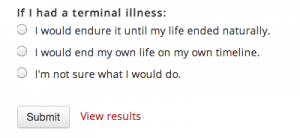At first, I thought it was Onion-style satire. I kept seeing a link show up in my Facebook feed to a Religion News Service (RNS) poll asking, “If you were Brittany Maynard, what would you do?” The link was not to another blog post or essay discussing Brittany Maynard’s decision to pre-emptively end her life on November 1 rather than allow her terminal brain cancer to progress and ultimately kill her. Rather, it was to a poll. An actual poll asking people to choose from among three options: 
I’m one of many bloggers who have written about Ms. Maynard’s decision. By making her decision public, with the support of Compassion and Choices (a nonprofit organization that supports “death with dignity”), Ms. Maynard invited us to talk about the many, complex concerns faced by people with terminal illnesses who have difficult decisions to make about what kind of care and treatment to pursue (or not), and particularly about whether people should have the legal right to choose physician-assisted suicide. My post on the topic has led to lengthy conversations, here and in person. I’ve spent hours responding to commenters and further considering what I do and don’t believe about pain and suffering, illness and impairment, and how the Christian story might inform our living and our dying. The issues involved are highly charged, difficult, and many-layered. They cannot be reduced to a three-point poll.
Furthermore, what I would do if I had a terminal illness isn’t a terribly relevant question. One reason that ethics is such a complicated and fraught field is that people facing stressful, difficult, unexpected circumstances frequently make decisions quite different from what they thought they would. Sometimes vocally pro-life people decide to have abortions, and vocally pro-choice people realize they can’t possibly end a pregnancy, no matter how unexpected and difficult it might be. One person who has always been against the death penalty might realize that they want to see the person who murdered their family member put to death, while someone who always supported the death penalty might realize that their healing lies in a different direction than seeing their loved one’s murderer executed.
While we absolutely must make the stories and circumstances of real people part of our ethical deliberation, we don’t decide ethics, law, and policy based on anecdote and personal leanings. We make ethical deliberations by considering people’s circumstances and leanings in the context of bigger-picture principles, values, and assumptions. Such deliberations are really, really hard, partly because many of us are sympathetic to a variety of perspectives. We see layers of meaning, and different valid ways of answering these tough questions.
And that’s good. The conversation is good. I am very grateful to Brittany Maynard for inviting us into this most intimate decision. I know I’m much more clear on the questions raised by terminal illness, palliative care, and assisted suicide than I was before writing about her situation and inviting readers to comment. But getting to that place of greater clarity around what I think and believe took time and the hard work of respectful conversation with those who feel differently than I do. It didn’t come from giving a knee-jerk answer to a three-question poll.
The problems, complications, and pitfalls of online religious and ethical discourse are legion. The RNS Brittany Maynard opinion poll represents a particularly low point in a milieu not exactly known for its care, respect, and discretion when it comes to fraught cultural questions and issues. Shame on you, RNS.











